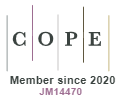O isolamento social alterou o curso do desenvolvimento motor de bebês nascidos durante a pandemia do COVID-19?
DOI:
https://doi.org/10.5585/23.2024.26054Palavras-chave:
Desenvolvimento infantil, fisioterapia, saúde da criança, neurodesenvolvimento, SARS-CoV-2Resumo
Resumo
Introdução: a pandemia pelo novo Coronavírus e o consequente isolamento social afetaram a rotina de famílias durante aquele período.
Objetivo: avaliar o desenvolvimento motor de bebês típicos nascidos pré e durante a pandemia.
Método: estudo transversal, composto por 18 bebês, nove nascidos antes (14,4±3,1 anos) e nove nascidos após a pandemia (14,9±3,5 anos). A escala Alberta Infant Motor Scale (AIMS) foi utilizada para avaliar o desenvolvimento motor.
Resultados: não foram observadas diferenças entre os grupos com relação aos resultados brutos da AIMS (p>0,05). Quatro bebês nascidos durante o período de pandemia pelo COVID-19 foram classificados como pertecendo ao percentil 75-100.
Conclusão: para esta amostra, sugerimos que o desenvolvimento motor não tenha sido afetado durante este período de falta de interação com o ambiente externo, devido ao ambiente familiar ter se mostrado promissor.
Downloads
Referências
Massetti GM, Jackson BR, Brooks JT, Perrine CG, Reott E, Hall AJ, et al. Summary of Guidance for Minimizing the Impact of COVID-19 on Individual Persons, Communities, and Health Care Systems - United States, August 2022. MMWR Morb Mortal Wkly Rep. 2022;71(33):1057-64. https://doi.org/10.15585/mmwr.mm7133e1
Araújo SLM, Feitosa TA, Pereira VC, Andrade CC, Silva ATP, Andrade LV, et al. Clinical characteristics and laboratory parameters associated with the risk of severe COVID-19 in patients from two hospitals in Northeast Brazil. Rev Soc Bras Med Trop. 2022;55:e0119. https://doi.org/10.1590/0037-8682-0119-2022
Almeida ILL, Rego JF, Teixeira ACG, Moreira MR. Social isolation and its impact on child and adolescent development: a systematic review. Rev Paul Pediatr. 2022;40:e2020385. https://doi.org/10.1590/1984-0462/2022/40/2020385
Patrick SW, Henkhaus LE, Zickafoose JS, Lovell K, Halvorson A, Loch S, et al. Well-being of Parents and Children During the COVID-19 Pandemic: A National Survey. Pediatrics. 2020;146:e2020016824. https://doi.org/10.1542/peds.2020-016824
O'Donnell KJ, Meaney MJ. Fetal Origins of Mental Health: The Developmental Origins of Health and Disease Hypothesis. Am J Psychiatry. 2017;174(4):319-328. doi:10.1176/appi.ajp.2016.16020138
Monk C, Lugo-Candelas C, Trumpff C. Prenatal Developmental Origins of Future Psychopathology: Mechanisms and Pathways. Annu Rev Clin Psychol. 2019;15:317-344. doi:10.1146/annurev-clinpsy-050718-095539
Van den Bergh BRH, van den Heuvel MI, Lahti M, Braeken M, Rooij SR, Sonja E, et al. Prenatal developmental origins of behavior and mental health: The influence of maternal stress in pregnancy. Neurosci Biobehav Rev. 2020;117:26-64. doi:10.1016/j.neubiorev.2017.07.003
Valentini NC, de Almeida CS, Smith BA. Effectiveness of a home-based early cognitive-motor intervention provided in daycare, home care, and foster care settings: Changes in motor development and context affordances. Early Hum Dev. 2020;151:105223. doi:10.1016/j.earlhumdev.2020.105223
Valentini NC, Saccani R. Infant Motor Scale of Alberta: Validation for a population of Southern Brazil. Rev Paul Pediatr. 2011;29(2):231-8. doi:10.1590/S0103-05822011000200015
Mascarello KC, Horta BL, Silveira MF. Maternal complications and cesarean section without indication: systematic review and meta-analysis. Rev Saude Publica. 2017;51:105. doi:10.11606/S1518-8787.2017051000389
Zago JTC, Pinto PAF, Leite HR, Santos JN, Morais RLS. Association between neuropsychomotor development and biological and environmental risk factors in early childhood children. Revista CEFAC. 2017;19 (3): 320-329. doi: 10.1590/1982-0216201719314416
Lundborg P, Nilsson A, Rooth, DO. Parental Education and Offspring Outcomes: Evidence from the Swedish Compulsory School Reform. American Economic Review: Insights. 2014; 6(1):253-78. doi: 10.1257/app.6.1.253
Lopes LSS, Chiquetti EMSS. A influência do estado civil das mães no desenvolvimento motor de crianças avaliadas na policlínica municipal de Uruguaiana/RS. In: 11º Congresso Internacional da Rede Unida.Interface (Botucatu); 2014 abril 10-13; Fortaleza, Brasil.
Hadders-Algra M. Typical and atypical development of reaching and postural control in infancy. Dev Med Child Neurol. 2013;55(4):5-8. https://doi.org/10.1111/dmcn.12298
Hadders-Algra M. Early human motor development: From variation to the ability to vary and adapt. Neurosci Biobehav Rev. 2018;90:411-27. https://doi.org/10.1016/j.neubiorev.2018.05.009
Martins E, Szymanski H. A abordagem ecológica de Urie Bronfenbrenner em estudos com famílias. Estud Psicol. 2004;4(1):63-77.
Assis D, Moreira L, Fornasier R. Teoria Bioecológica de Bronfenbrenner: a influência dos processos proximais no desenvolvimento social das crianças. Res, Soc Dev. 2021;10(10):e582101019263. https://doi.org/10.33448/rsd-v10i10.19263
Zoghi A, Gabbard C, Shojaei M, Shahshahani S. The Impact of Home Motor Affordances on Motor, Cognitive and Social Development of Young Children. Iran J Child Neurol. 2019;13(2):61-9. https://doi.org/10.22037/ijcn.v13i2.17044
Silva WR, Lisboa T, Ferrari EP, Freitas KTD, De Cardoso FL, Motta NFA, et al. Oportunidades de estimulação motora no ambiente domiciliar de crianças. Rev Bras Crescimento Desenvolv Hum. 2017;27(1):84-90. https://doi.org/10.7322/jhgd.127659
Mori S, Nakamoto H, Mizuochi H, Ikudome S, Gabbard C. Influence of affordances in the home environment on motor development of young children in Japan. Child Dev. Res. 2013, 898406. https://doi.org/10.1155/2013/898406
Oliva-Arnanz A, Romay-Barrero H, Romero-Galisteo RP, Pinero-Pinto E, Lirio-Romero C, Palomo-Carrión R. Families' Perceptions of the Motor Development and Quality of Life of Their Children Aged 0-3 Years during Home Confinement Due to the COVID-19 Pandemic: A Descriptive Study. Children (Basel). 2021;8(12):1149. https://doi.org/10.3390/children8121149
Fan Y, Wang H, Wu Q, Zhou X, Zhou Y, Wang B et al. SARS pandemic exposure impaired early childhood development in China. Sci Rep 2021;11(1):8694. https://doi.org/10.1038/s41598-021-87875-8
Huang P, Zhou F, Guo Y, Yuan S, Lin S, Lu J, et al. Association Between the COVID-19 Pandemic and Infant Neurodevelopment: A Comparison Before and During COVID-19. Front Pediatr. 2021;9:662165. https://doi.org/10.3389/fped.2021.662165
Shuffrey LC, Firestein MR, Kyle MH, Fields A, Alcántara C, Amso D et al. Association of Birth During the COVID-19 Pandemic With Neurodevelopmental Status at 6 Months in Infants With and Without In Utero Exposure to Maternal SARS-CoV-2 Infection. JAMA Pediatr. 2022;176(6):e215563. https://doi.org/10.1001/jamapediatrics.2021.5563
Biondo BDC, Gerzson LR, Almeida LR. Percepção dos cuidadores sobre a telerreabilitação da fisioterapia em bebês de risco até os três anos de idade: barreiras e facilitadores. Movimenta.2022;15(2):1-14. https://doi.org/10.31668/movimenta.v15i2.13026
Downloads
Publicado
Como Citar
Edição
Seção
Licença
Copyright (c) 2024 Amanda Beneduzi, Laís Rodrigues Gerzson, Carla Skilhan de Almeida

Este trabalho está licenciado sob uma licença Creative Commons Attribution-NonCommercial-ShareAlike 4.0 International License.
- Resumo 217
- pdf 149








